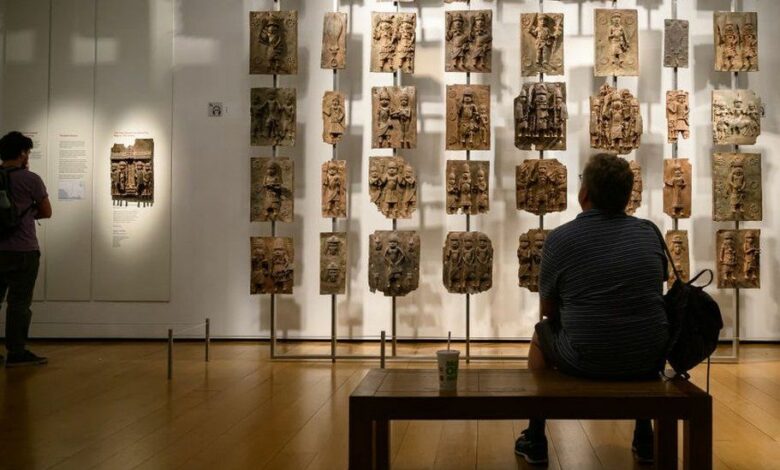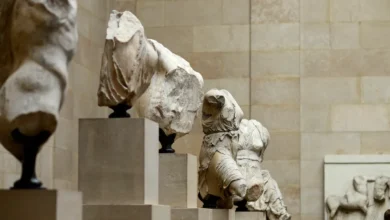British Museum recovers some of 2,000 stolen items

About 2,000 treasures are thought to have been stolen from the British Museum, but recovery has begun of some of them, chairman George Osborne has said.
The ex-chancellor accepted the museum’s reputation has suffered but said “it is a mess we are going to clear up”.
A leading expert in looted antiquities told the BBC the number of objects lost from the museum was “mind-blowing”.
A staff member the museum suspects of involvement has been sacked.
And it was announced on Friday that Hartwig Fischer, the museum’s director, will step down immediately after accepting a 2021 investigation was mishandled.
The museum, one of the UK’s most prestigious cultural institutions, has been under pressure since revealing earlier this month that a number of treasures were reported “missing, stolen or damaged”.
The items involved dated from the 15th Century BC to the 19th Century AD and had been kept primarily for academic and research purposes.
Mr Osborne – who was appointed as chair in June 2021 – told BBC Radio 4’s Today programme: “We believe we have been the victim of thefts over a long period of time and frankly more could have been done to prevent them.”
Asked where the missing items were located, he said: “Some members of the antiquarian community are actively co-operating with us” and that recoveries so far were a “silver lining to a dark cloud”.
He said he was confident that “honest people” would return items found to have been stolen, but acknowledged that “others may not”.
Founded in 1753, the British Museum has amassed a collection of around eight million items, but as of 2019 only around 80,000 were on public display, with the rest held in storage.
Mr Osborne said that not all of the items were “properly catalogued and registered” and suggested “someone with knowledge of what is not registered has a big advantage in removing” them.
The museum is working closely with the police, Mr Osborne said, adding that a “forensic job” is under way to establish precisely what is missing. He said security at the museum needed to be improved.
“It has certainly been damaging to the British Museum’s reputation, that is a statement of the obvious, and that is why I’m apologising on its behalf,” Mr Osborne added.
A man has been interviewed by Metropolitan Police detectives over the missing items but no arrests have been made.
Senior figures at the museum have scrambled to address how they handled the discovery of missing items after it emerged concerns about potential thefts were first raised two years ago.
Mr Osborne said “more could have been done” after theft concerns were first raised in February 2021.
Asked why they were not taken seriously, he said he did not believe there was a “cover-up” at the top of the museum, but said it was “possible” that “groupthink” among senior staff meant they “could not believe that there was an insider” stealing treasures.
Christos Tsirogiannis, a forensic archaeologist who chairs a Unesco group dedicated to illicit antiquities trafficking, described the thefts as the worst in modern history.
He said: “It is by far the biggest theft that I know about from a museum, especially for one of this calibre.
“It’s a massive amount for any museum, but this happening at the British Museum makes it even worse.”
‘Disaster waiting to happen’
Dr Tsirogiannis called on the museum to immediately publish a list of what is missing to help experts assist with the search.
He said: “I don’t have any evidence to start checking. By not publishing a list of what is missing, they are tying the hands of experts who should be helping. I would love to help but I can’t.”
Mr Osborne said that the museum was working very closely with the police – who were “the only people” who could put a list of stolen items on Interpol – and with the Art Loss Register, a register of stolen items.
Professor Dan Hicks, a curator at Oxford University’s Pitt Rivers Museum, criticised the quality of the British Museum record keeping in the Guardian, saying “this was a disaster waiting to happen”.
Mr Osborne admitted not all the objects in the British Museum’s possession have been formally recorded.
He insisted it was “not unique” for a large museum to not fully catalogue its whole collection and that it “was ahead of many of the big museums in doing this work”.
Dr Tsirogiannis said recording objects was the “primary responsibility of a museum”. He claimed the British Museum had made “a deliberate choice to put money into glossy catalogues and events without recording their objects”.
Mr Fischer, who has held the position of director since 2016, confirmed on Friday that he would leave his role once an interim replacement had been appointed.
The museum director was previously due to step down in 2024.
He also apologised for “misjudged” remarks alleging the antiques dealer who first raised concerns in 2021 had withheld information about the missing items.
Deputy director Jonathan Williams – who was involved with the 2021 investigation – will step back from his normal duties until an independent review launched by the museum concludes.
The scandal has prompted questions about the British Museum’s wider role as an institution housing objects from around the world.










